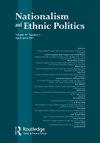Reserved Indigenous Seats and Electoral Turnout: Evidence from the Chilean Constitutional Convention
IF 1.1
Q3 ETHNIC STUDIES
引用次数: 1
Abstract
Abstract Two hypotheses are common in the literature on the electoral turnout of Indigenous people. The first is that Indigenous people vote less given their disadvantaged socioeconomic conditions. The second is that Indigenous people vote more when the alternatives on offer are relevant to them. To evaluate both perspectives, we study the election of members of a constitutional convention responsible for drafting a new Constitution 2021. For this election, 155 seats were to be distributed, 17 of which were reserved for Chile’s 10 native peoples, to whom a special ballot paper was assigned. Of registered Indigenous voters, only 22.8% voted using the Indigenous ballot, while the overall turnout stood at 43.4%. We present three findings. First, the use of the Indigenous ballot was greater in those municipalities with a larger proportion of Indigenous people, which pointed to a strong territorial determination of turnout. Second, the electoral turnout of the 10 native peoples is highly uneven, with greater participation observed in people that are less numerous. Third, although the overall electoral turnout in a municipality was lower the greater the number of its Indigenous people, the opposite occurred in Araucanía, a region with the largest proportion of Indigenous population.保留的土著席位和选举投票率:来自智利制宪会议的证据
摘要关于原住民的投票率,文献中有两种常见的假设。首先,由于土著居民的社会经济条件较差,他们的投票率较低。其次,当提供的替代方案与土著人民相关时,他们会更多地投票。为了评估这两种观点,我们研究了负责起草2021年新宪法的制宪会议成员的选举。这次选举将分配155个席位,其中17个保留给智利的10个土著民族,并发给他们一张特别的选票。在登记的土著选民中,只有22.8%的人使用土著选票投票,而总体投票率为43.4%。我们提出了三个发现。第一,在土著居民比例较大的城市,使用土著选票的情况较多,这表明对投票率有很强的地域决定作用。第二,这10个土著民族的投票率极不均匀,人数较少的人参与得更多。第三,虽然一个城市的总投票率越低,其土著人民的人数越多,但土著人口比例最大的Araucanía地区的情况正好相反。
本文章由计算机程序翻译,如有差异,请以英文原文为准。
求助全文
约1分钟内获得全文
求助全文
来源期刊

Nationalism and Ethnic Politics
ETHNIC STUDIES-
CiteScore
1.30
自引率
0.00%
发文量
30
期刊介绍:
Nationalism & Ethnic Politics explores the varied political aspects of nationalism and ethnicity in order to develop more constructive inter-group relations. The journal publishes case studies and comparative and theoretical analyses. It deals with pluralism, ethno-nationalism, irredentism, separatism, and related phenomena, and examines processes and theories of ethnic identity formation, mobilization, conflict and accommodation in the context of political development and "nation-building". The journal compares and contrasts state and community claims, and deal with such factors as citizenship, race, religion, economic development, immigration, language, and the international environment.
 求助内容:
求助内容: 应助结果提醒方式:
应助结果提醒方式:


